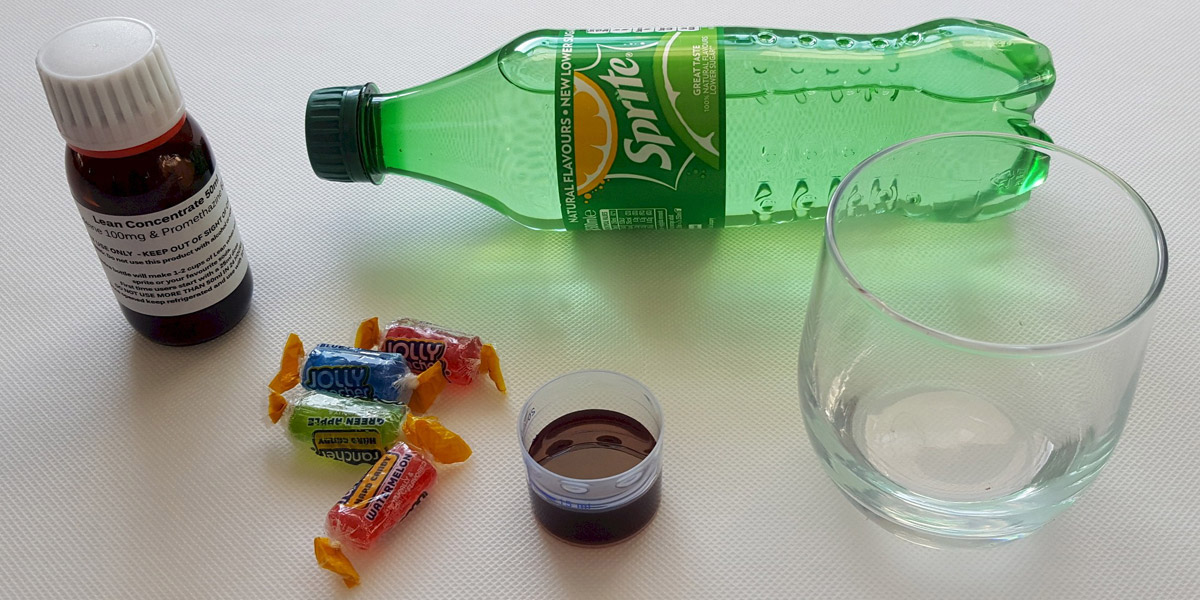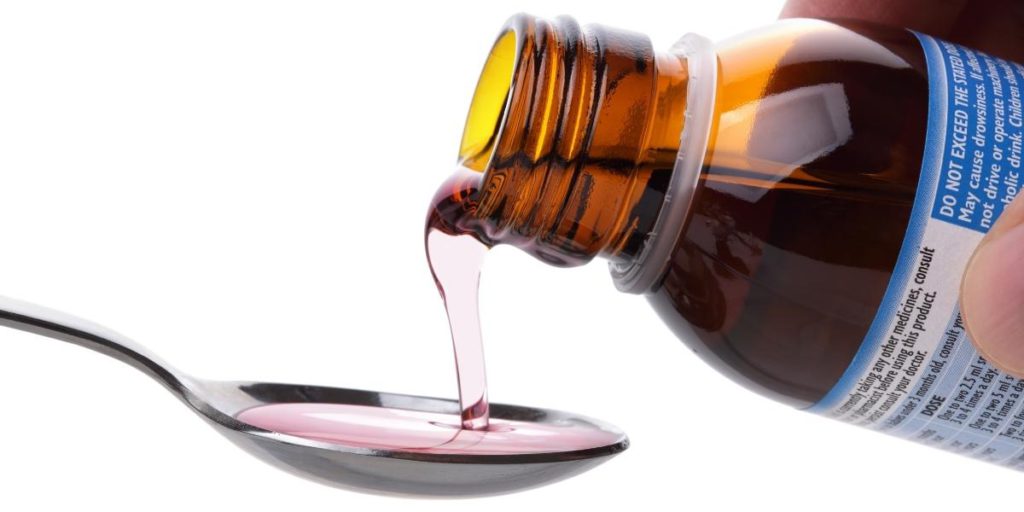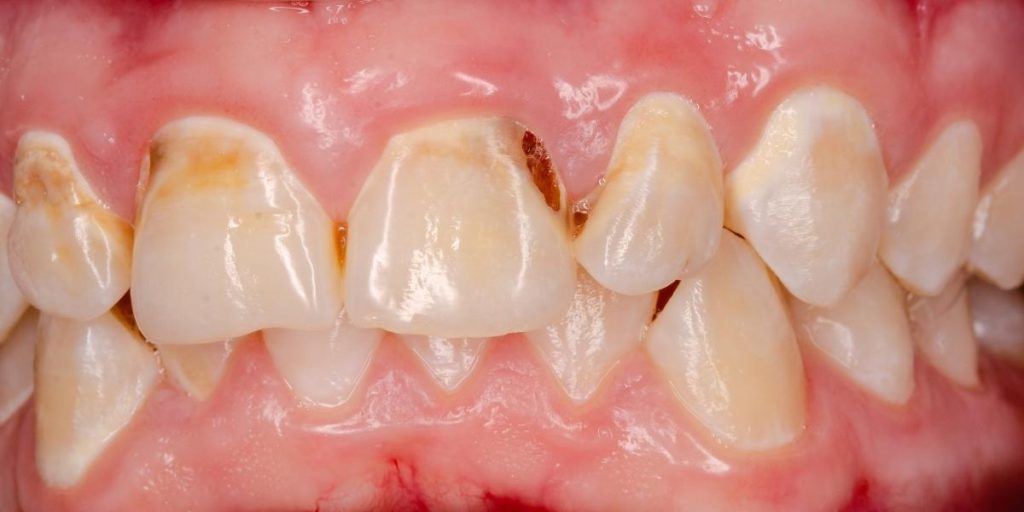What Is Lean? (Purple Drank)
Lean Addiction and Abuse

Nicknamed lean and purple drank, the mixture of codeine cough syrup and soda is a popular recreational drug, especially in hip-hop and pop culture.
Countless music videos have featured people drinking lean out of red Solo cups or two styrofoam cups, known as “double cup.” Yet, several of them have become addicted or died from complications of it.
Despite the hype and glamour around it, purple drank can easily lead to addiction, opioid use disorder, and overdoses.
What Is Lean (Purple Drank)?
Lean, also known as purple drank, is a mixture of prescription-strength cough syrup containing promethazine and codeine and a soft drink. Users will sometimes mix the codeine cough syrup with soda and candy, like a Jolly Rancher, to make it fruit-flavored and easier to drink.
The nickname purple drank came about because many cough syrups containing codeine have a purple coloring that gives the mixture the same color. However, lean doesn’t always have to be purple because some people mix cough syrup with sports drinks, juice, or alcohol instead of soda and candy.
Lean Drug Definition
Leans primary ingredients are codeine and promethazine.
Codeine is an opioid analgesic. Opioid analgesics are pain killers derived from the poppy plant and are highly addictive. Codeine works for pain relief and as a cough suppressant.
According to the Centers for Disease Control and Prevention (CDC), over 70% of drug overdose deaths in 2019 involved an opioid.
Promethazine is an antihistamine. Antihistamines suppress allergy symptoms like hives, sneezing, and runny noses.
Codeine and promethazine are known for their sedative effects. However, according to the National Institute on Drug Abuse (NIDA), in high doses, promethazine with codeine can produce euphoric effects and relaxation.
According to the Drug Enforcement Agency (DEA), because codeine, the main active ingredient in lean, is a controlled prescription pain medication, some users will substitute over-the-counter cough syrups containing Dextrothmorphan (DXM), a cough suppressant found in over 120 different cold medicines.
Lean Drug Slang
Lean got its name because users become drowsy and tend to lean over after drinking it. It is sometimes called purple drank, sizzurp, Texas tea, and other slang names that refer to the ingredients mixed with prescription cough syrup.
A list of common lean drug slang includes:
- Purple drank
- Drank
- Sizzurp
- Dirty Sprite
- Oil
- Syrup
- Texas tea
- Purple stuff
- Player potion

Why Is Lean So Popular?
Lean became popular because it is widely referenced and glamorized in pop culture, especially hip-hop.
Cough syrup consumed in large doses to get the effects of codeine wasn’t uncommon around Houston, Texas, especially among blues musicians.
Still, it wasn’t until the 1990s when rapper and producer DJ Screw from Houston heavily referenced it in his lyrics and credited it for his unique slowed-down production style that lean gained national attention.
DJ Screw died in 2000 from an accidental overdose. The autopsy revealed that he had codeine, Valium, and PCP in his system when he died.
Rappers like Lil’ Wayne, 3 6 Mafia, 2 Chains, Future, Juice Wrld, Mac Miller, and even Justin Bieber have referenced purple drank, sizzurp, and lean in their music and interviews.
On top of being famous by association, lean is popular because of how widely available cough syrup containing codeine or Dexthromorphan (DMX) is and its highly addictive nature.
Several soft drink companies have made products with herbal ingredients that can mimic the sedating effects of codeine. Even though these drinks do not have the same active ingredient as lean, the United States Department of Justice (DOJ) considers them a possible gateway to codeine use, substance abuse, and addiction.
Lean Drug Effects
The desired effects include relaxation and a sense of euphoria or an intense feeling of excitement and happiness. It also coats the tongue and cheeks giving a mouthfeel that users enjoy.
Some of the short-term effects of lean include:
- Drowsiness
- Loss of coordination
- Lightheadedness
- Dizziness
- Fainting
- Constipation
- Nausea and vomiting
- Blurry vision
- Breathing problems
- Confusion or disorientation
- Flushing and redness of the face and skin
- Difficulty swallowing
- Stomach aches
Because most people don’t measure out the ingredients when they mix lean, it’s hard to tell which effects you’ll experience and how long they’ll last.
Mixing purple drank with alcohol and other drugs increases the risk of unwanted side effects and fatal opioid overdose.
Side Effects of Lean Abuse
Lean is highly addictive, and repeatedly drinking purple drank can have lasting side effects.
Feeling the effects of lean requires taking high doses and like other opiate-based drugs, repeatedly abusing it will take a toll on your body and brain.
Some side effects of lean abuse include:
- Memory loss
- Urinary tract infections
- Constipation
- Weight gain
- Trouble sleeping
- Vivid dreams
- Hallucinations
- Irregular heartbeat
- Tooth decay or “lean teeth”

Long-Term Risks and Side Effects
Long-term use of lean can lead to tolerance and the need to increase amounts to achieve a high or avoid opioid withdrawal symptoms. Lean users are at risk for many physical and mental health issues, including addiction, opioid misuse, and opioid use disorder.
Additionally, lean, which already has sedating effects, can lead to life-threatening interactions if mixed with alcohol and other drugs, especially muscle relaxants.
Adverse effects of long-term lean abuse include:
- Memory loss
- Cognitive impairment
- Seizures or epilepsy
- Liver damage
- Kidney damage
- Infertility
- Sexual dysfunction
- Changes in menstrual cycles
- Numbness in the face and limbs
- Vision loss
- Coma
- Overdose
- Death
Lean Addiction and Abuse
Lean addiction can happen quickly, and as tolerance increases, abuse becomes more common and dangerous.
There is a misconception that lean is safe because codeine is a prescription medication and not as strong as other opiates. Furthermore, because users drink it instead of taking pills, snorting, or injecting it like other prescription opioid-based drugs, many people don’t consider lean to be a “hardcore” drug.
These ideas are not true, and failing to recognize addiction can be dangerous.
Rapper Lil’ Wayne once said in an interview with MTV that quitting lean “ain’t that easy; it feels like death in your stomach when you stop.”

Withdrawal Symptoms
Lean affects the central nervous system, and when the body becomes dependant on it, users will go into withdrawal when they stop using it. The fear of codeine withdrawal is the main reason people continue to abuse lean, and many will need professional care and help to address their addiction.
Withdrawal can be dangerous and even life-threatening, with symptoms including:
- Shaking
- Twitching
- Muscle pain
- Stomach cramps
- Diarrhea
- Vomiting
- Hot and cold flashes
- Sweating
- Difficulty sleeping
- Breathing problems
- Increased heart rate
If you are addicted to lean, you will experience withdrawal if you suddenly stop using. If you plan on quitting, you should seek medical advice.
Lean Addiction Treatment in Los Angeles
It is important to remember that addiction to lean is the same as addiction to any other opioid drug and just as dangerous and challenging to overcome.
Our licensed staff at Northridge Addiction Treatment Center can address your dangerous withdrawal symptoms with on-site medically assisted detox.
After successfully and comfortably completing detox, we help smoothly transition you to settle into our serene residential treatment facility, where you can start your path to recovery surrounded by support and compassion.
We collaborate with you to tailor an individual and successful treatment plan that will integrate proven methods like dual-diagnosis, behavioral therapy, and support groups.
Our goal at NATC is to heal your mind and body and give you the skills to experience life in new and meaningful ways with long-lasting recovery.
Our administration specialists can verify your insurance to see if it covers the cost of treatment and answer any other questions or concerns you might have.
Taking the first steps towards a life in recovery can be overwhelming, but you don’t have to do it alone. Reach out to start your journey today with the peace of mind that we are here to help every step of the way.
Find Meaningful Recovery
Our caring and compassionate specialists are eager to help you comfortably navigate this journey to recovery. Our individualized treatment plan, programs, and therapies may be a perfect match for you or your loved one. Let us assist you in living the happy life you deserve. It starts with a phone call.




